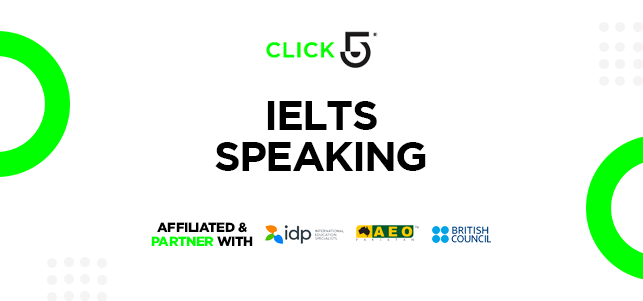
24/7 Support
(021) 34834171

24/7 Support
(021) 34834171

The Speaking test takes about 11 to 15 minutes and is conducted like an interview by an examiner who assesses candidates on fluency, coherence, grammar, accuracy, and pronunciation.
The examiner generally conducts the Speaking test in 3 parts and records the entire conversation.
Part 1:
IELTS speaking part 1 is about YOU.
The examiner will ask you familiar, everyday questions about your life. This will last around 4-5 minutes. The examiner will ask general questions to the candidate about his/her family, job, studies, interests, and a wide range of other topics related to the candidate’s introductory information.
Part 2:
This part is sometimes called the ‘long turn’.
You will be given a cue card and you will have 1 minute to prepare your answer. You will then be asked to speak for 1 to 2 minutes on a particular topic for which they get a minute to prepare and make notes. After the candidate has finished speaking, the examiner may ask a couple of questions on the same topic.
Part 3:
Part 3 is more abstract.
This is your opportunity to really develop your answers and discuss the issues brought up by the examiner. The topic will be linked to the topic you discussed in Part 2, and this will last 4-5 minutes.
It is better to practice a little bit every day and improve your skills gradually than to speak your native language all week until you have an IELTS class.
It takes most IELTS students 10-15 minutes to ‘warm-up’ and performs to the best of their ability on test day. Just like an athlete needs to warm up before a sporting event. Therefore, you should speak, write, read and listen to English for 24 hours before your IELTS Speaking test. It will make a huge difference to your score.
‘Yes,’ and ‘No’ are NOT satisfactory answers in your IELTS Speaking test – you need to show the examiner how good your English is. If you give very short answers, there is no way the examiner can know how good you are. Extend your answers using examples and reasonings.
There are many ways that you can practice speaking. The most important things to remember are:
It is better to practice on your own than not practice at all. Don’t let the lack of a partner stop you from practising.
There are thousands of ways to practice with a partner online. You’ll find some in the articles below.
Focus on the 4 marking criteria. Everything else is irrelevant.
Be a reflective learner. Record your practice sessions and honestly appraise your performance.
Practising for the sake of it will not help. You need to identify your weaknesses and take action on improving those shortcomings.

Copyright © Click5 . All Rights Reserved